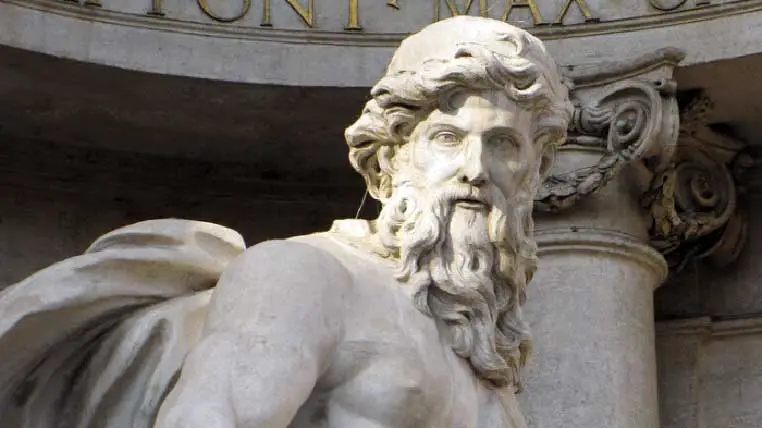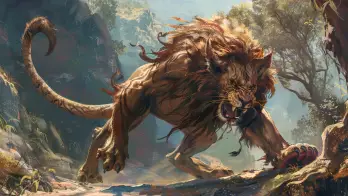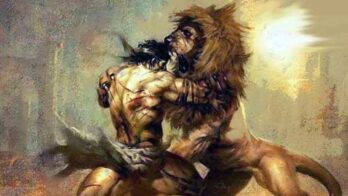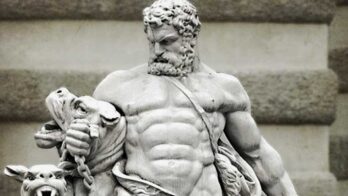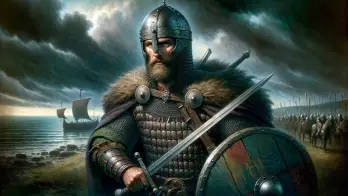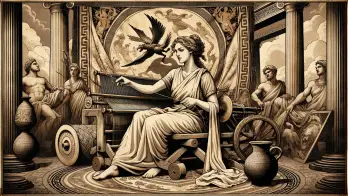As one of the first descendants of the goddess Gaea, also known as the personification of Mother Earth, Uranus embodied a significant cosmic force in the ancient Greek world.
According to Greek mythology, the union between Uranus and Gaea led to the birth of some of the most fearsome creatures in Greek mythology.
While some myths describe him as a distant and inscrutable entity, others depict him as one half of a cosmic partnership that created the universe as the ancient Greeks knew it.
Etymology
The term “Uranus” (Greek Οὐρανός, translit. Ouranós) has its roots in ancient Greek and denotes “sky” or “heaven.” Scholars believe the name likely comes from the Indo-European root *ṷérs-, which means “to rain.” Therefore, the god’s name translates to “the rainmaker.”
Another theory regarding the etymology of Uranus’ name links it to the Indo-European root for “height,” akin to Sanskrit’s várṣman (“height, top”) or Lithuanian’s viršùs (“upper, highest seat”).
This linguistic hypothesis asserts that Uranus’ name would translate to “he who stands on high.”
However, this theory is not widely accepted in contemporary scholarship.
His name is typically Latinized as Uranus by the Romans. Nevertheless, Roman writers occasionally employed other synonymous names for the sky god, such as Caelus and Aether.
Characterization
Uranus, a primordial deity from Greek mythology, is an enigmatic entity whose existence was not defined explicitly in myths and legends.
He was perceived as a force or essence, embodying the creative and generative power of the sky, which provided the earth with warmth and moisture, enabling the development of life.
Uranus and Gaea formed all things, representing the masculine half of a duality.
Due to his primordial nature, he was never personified in anthropomorphic terms nor represented in ancient Greek art.
However, the Romans identified him with other deities, such as Caelus, the god of the sky, and Aeon, the god of time.
In Roman mythology, the god acquired physical form, often depicted as a well-built, bare-chested, young man without a beard, sculpted in reliefs or on marble sarcophagi.
Genealogy
The origin of this primordial god of Greek mythology remains somewhat unclear, with various versions regarding the “birth” of this primordial deity.
While most Greeks saw Uranus as a cosmic entity born from Chaos, the Greek poet Hesiod firmly believed he was born from Gaea.
Calimah and Alcman attributed both a father and a mother to Uranus, specifically Aether, the god of the upper light of the sky and the pure air.
In his work De Natura Deorum, Cicero states that the god originates from two ancient deities, Hemera (day) and Aether (air).
Other sources describe Uranus as the son of Nyx, the goddess of the night, or the son of Oceanus and Tethys, with Gaea being more of a sister and consort than a mother.
In one early myth, Acmon, an obscure son of Gaea, is described as the father of Uranus.
Uranus and Gaea gave birth to the Titans, as recorded in Hesiod’s Theogony.
The Titans were six sons (Coeus, Crius, Oceanus, Hyperion, Cronos, and Iapetus) and six daughters (Themis, Thetys, Phoebe, Rhea, Theia, and Mnemosyne).
He also had other descendants, including the Hecatonchirii (Gyges, Cottus, and Briareus – three legendary monsters with 100 hands and 50 heads); the cyclopes Steropes, Brontes, and Arges (eventually known as the “one-eyed giants”); the Erinyes; and Moirai.
Myths and Legends
Greek mythology is one of the oldest and most intricate mythological systems, and it begins with the separation of the heavens and the earth.
According to the genealogical poem Theogony, attributed to Hesiod, the creation of the cosmos from the ancient Greek perspective culminates with the castration of Uranus by his son Cronos, thus severing his bond with Gaea.
Origins
The myth of Uranus and Gaia is one of the most important stories in Greek mythology.
According to Hesiod’s Theogony, Uranus was the sky-god and Gaia was the earth-goddess. The two were originally united in a close embrace, but eventually, they were separated, culminating in Uranus being castrated and overthrown by his son Cronus.
This event marks the beginning of the “Succession Myth,” a cycle of conflicts and successions of divine rulers.
The story of Uranus and Gaia has many parallels with Near Eastern mythology, particularly the Hurro-Hittite cosmogony.
In this myth, Anu is the sky god who rules the cosmos, but he is eventually overthrown by Kumarbi, who bites off his genitals. Kumarbi then devours his own offspring, but Teshub manages to escape and ultimately overthrows him in turn.
This myth was adopted by the Hittites of Anatolia and eventually spread to the Greek world, where Anu became Uranus and Kumarbi became Cronus.
This myth also has similarities to other Near Eastern creation myths.
In Egyptian mythology, for example, the separation of Geb and Nut marks the beginning of the world’s creation. And in the Mesopotamian Enūma Eliš, the primordial couple of Apsȗ and Tiamat is similar to Uranus and Gaia.
Gaia and Uranus
Uranus’s rise and fall story is told in Hesiod’s Theogony, a text from around 800 BC that describes the world’s creation according to the ancient Greeks.
According to the poet, the earth goddess Gaia created Uranus as her first offspring. Hesiod writes that the god of the sky was “equal to herself, to cover her on every side, and to be an ever-sure abiding-place for the blessed gods.”
Legend has it that our world – the land full of flowers and fruits, with clear rivers and springs, the sun, moon, day, night, and the winds blowing swiftly – was not always the same.
The entire world was chaos, swirling and black, without boundaries, without shape. But, as the poets sang, from chaos emerged the earth – our wide and generous planet. And the world, torn from chaos, was the goddess Gaia herself.
Love united Gaia with the first man, Uranus. And he was the sky, the high sky full of stars.
To show his love, the god adorned her forehead with golden and luminous crowns as long as it was day, and at night he enfolded her in a blue-violet mantle full of shining stars.
He caressed her with rain and wind, never tired of telling her she would always be his as long as the world would be the world.
Gaia was a beautiful goddess and adorned herself with precious garments made from leaves and green herbs.
She also wore the finest scents of flowers in her hair and had clear, bright blue eyes that shone like a cleft lake. At the appointed time, Gaea gave birth to six sons and six daughters, whom she named Titans.
The firstborn was Oceanus, who encircled the earth with a shining belt of waters. The last one was Cronos, considered the wisest and most cunning of the Titans.
Following the Titans, three cyclops were born, each with a single eye in the middle of their forehead. They were skilled craftsmen and had learned to create lightning, thunder, and destructive bolts in a shelter under the ground.
After the cyclops, three more sons were born, known as the Hecatonchires or hundred-handed ones because they had monstrous bodies with a hundred long arms.
Gaia continued to give birth to more children, some with terrifying shapes, huge, ugly, and merciless.
Uranus Throws His Children into Tartarus
Despite fathering many children with Gaia, Uranus was a harsh and unloving father who grew increasingly paranoid that his offspring would try to overthrow him.
One day, the god summoned all his offspring and threw them into an abyss in Tartarus, an eternal realm of suffering deep within the Earth.
The prison was surrounded by three walls of brass, and a river of fire and pitch flowed nearby. Only Uranus had the key, and the sons could not escape this terrible fate.
Gaia was fearful as she saw her husband snatch away her newborn child and hurl him into the subterranean prison.
Despite the horror of this event, the god was calm and pleased to have escaped the looming threat. He smiled again at his wife and told her how dear she was to him.
Initially, Gaea had refrained from opposing her husband’s will and endured his commands and cruelty without any objection. However, she had reached her limit and was now fuming with anger.
The Fall of Uranus
Heartbroken at the fate of her children, Gaia crafted a great sickle from flint stone and persuaded the Titans, who were still free, in some versions of the myth, to overthrow and castrate Uranus.
Using spells known only to her, the goddess unlocked the enormous diamond gates and crept into the darkness until she reached her sons, the Titans.
In a hushed whisper, she asked them who among them was courageous enough to confront Uranus, knowing full well that he could not be killed as he was an immortal god. However, he could be defeated with the shiny weapon she had forged. So, the goddess challenged them to take his place as ruler.
Cronos was the only one among Gaea’s children with the courage to undertake this task. He whispered to his mother, assuring her he was prepared to fight and overthrow the merciless god.
Without a second thought, he took the sickle in his hand and, concealing its shining blade, crept out through the gates. Guided by Gaia, he hid behind some rocks, from where he could see anyone who approached but remained invisible to them.
He waited there, his teeth clenched, until nightfall, biding his time for the opportune moment to strike his father.
He knew the battle would be arduous and that failure would lead to severe consequences for himself and his mother. Suddenly, he saw Uranus approaching, descending from the heights of the sky, dragging the dark night behind him, in search of Gaia.
The subsequent confrontation is described in Hesiod’s Theogony, where it is recorded that Cronos emerged from his hiding place and stretched out his left hand while taking the great, long sickle with jagged teeth in his right hand.
He quickly severed his father’s limbs and flung them behind him.
Uranus, wounded and bleeding, writhed on the ground and uttered a dreadful curse upon Cronos, foretelling that he would suffer the same fate one day.
Hesiod writes that he called them the “Titans,” a Greek verb meaning “to strain,” “for he said that they strained and did a fearful deed presumptuously and that vengeance for it would come afterward.”
However, Cronos paid no heed, basking in his victory and elating. He ordered the diamond gates to open wide, and his brothers, the other Titans, promptly surged out.
In other versions of the story, it took all the Titans to overpower Uranus, with only Oceanus refusing to participate.
The castration of Uranus led to the birth of entire races of creatures.
The blood that fell upon the earth gave rise to the Erinyes, the Giants, and the Meliae, while the foam that bubbled from his genitals, cast into the sea by Cronus, gave birth to the beautiful Aphrodite.
After his overthrow, the god faded into obscurity, and Cronus took his place as the ruling deity.
But Cronus soon proved to be just as savage and cruel as his father, and he, too, tried to rid himself of his offspring.
Instead of banishing them to Tartarus, he swallowed them whole as soon as they were born. However, Rhea managed to conceal her last child, Zeus, with the help of Gaia and Uranus.
Zeus eventually overthrew Cronus and became the king of the gods, breaking the cycle of violent divine succession.
The Cult of Uranus
The god was not venerated as a deity in an established cult nor visually or figuratively represented. Despite this, he was occasionally called upon in oaths.
It is possible that Uranus assumed greater significance in his Roman manifestation as Caelus.
Roman invocations of “eternal Caelus” have been found, and Vitruvius, a Roman writer on architecture, advised that temples dedicated to Caelus should be open to the sky.
Caelus in Roman Mythology
Caelus, the Roman counterpart of Uranus, was not widely worshipped as a standalone deity in ancient Rome. However, he was sometimes invoked in oaths and may have taken on more importance under the Roman name of Caelus.
According to the Roman writer Vitruvius, temples dedicated to the Roman god were supposed to be unroofed, meaning that the sky was considered the temple’s ceiling.
One such temple was built in Rome in the 3rd century BC during the Second Punic War, but it is still being determined if it was dedicated solely to Caelus or shared with other deities.
Another temple dedicated to the god was built on the Quirinal Hill in Rome in the 5th century CE, during the late Roman Empire.
This temple, known as the Temple of Caelus and Magna Mater, was built to honor both Caelus and Cybele, the Magna Mater or Great Mother Goddess.
In terms of similarities and differences between the two primordial gods, both deities were associated with the sky and were considered to be the father of the gods.
However, there are some differences between the two. Uranus was a prominent figure in Greek mythology and was the first ruler of the universe, while Caelus played a more limited role in Roman mythology.
Additionally, Uranus was depicted as cruel and unloving, while his Roman counterpart was often associated with ideas of generativity and the procreation of life.
At Ancient Theory we only use trusted sources to document our articles. Such relevant sources include authentic documents, newspaper and magazine articles, established authors, or reputable websites.
- Richard Caldwell - The Origin of the Gods: A Psychoanalytic Study of Greek Theogonic Myth. Oxford University Press, 1993.
- T.P. Wiseman - Remus: A Roman Myth. Cambridge University Press, 1995.
- Mary Beard, John North, and Simon Price - Religions of Rome. Cambridge University Press, 1998.
- Uranus (mythology). wikipedia.org. [Source]
- Emily Gowers - The Loaded Table: Representations of Food in Roman Literature. Oxford University Press, 1993.
- Jennifer Carnevale - Greek God Uranus: Origin, Family & Symbolism. [Source]
